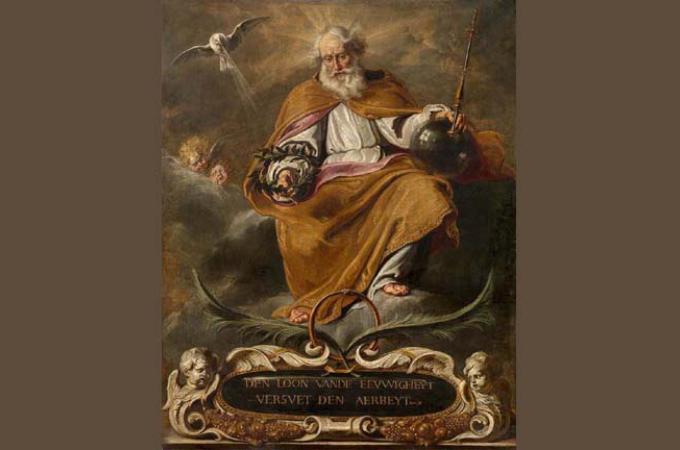The first point of faith
We say it so often and so quickly that we may not even appreciate what we are saying, "I believe in God the Father Almighty, maker of heaven and of earth, of all things, visible and invisible." Found at the beginning of our creeds, it is the first point of Christian faith.
If he is the maker of all things, then he did not presuppose anything already existing, when he made. It is not as though there was stuff there, like playdough, and he shaped it. Nothing was there, and, if anything came to be shaped, he made that stuff first and then made it have shape. To say this is to say that he made "from nothing," ("ex nihilo").
If we think of making as a kind of addition, we can express the value or scope of that addition in a proportion. If, for example, to make bricks counts as five, but then to shape the bricks into a fireplace counts as 100, the proportion of making the fireplace to making the bricks is 20 to one. Obviously, as the value of the stuff from which something is made decreases, the value of the addition increases. That is why people say that the gap from nothing to something shown in creation is infinite.
God is "almighty." Creation shows an infinite power. To say that God is almighty is to say that his making is not constrained by anything outside of himself. There are no materials with unbendable characteristics, to which he must bend in making. He is "constrained" only by the principle of noncontradiction and his virtues, such as justice and mercy.
This consideration shows the way out of a common objection from scientists. They say that on the best theory the universe originated in a space-time singularity, where time came into existence as well as matter. It's a mistake, then, they say, to imagine that nothingness preceded the universe in time. The Christian creed, they say, posits a cause for an effect which never was.
But Christians can happily accept the premise of this objection. Of course, time itself is a creature -- as if God and the angels existed within our measured time! Go back to St. Augustine and Boethius, and you will see that Christian philosophers never maintained anything else. But God, in making time, we assert, was not constrained by anything else. It may be the case, for instance, that what we call "time" is an aspect of a bubble, our "universe," in a larger soup of countless other bubbles -- as the theory of an inflationary universe holds. But in saying that God is almighty, we assert that God, who made the soup, if there is a soup, could have made the bubble as he wished without the soup, and that to make the soup he did not need a pot or ingredients.
"Son, have pity on me, who carried you in my womb for nine months, nursed you for three years, brought you up, educated and supported you to your present age," says the mother in 2 Maccabees to her sons, "I beg you, child, to look at the heavens and the earth and see all that is in them; then you will know that God did not make them out of existing things. In the same way, humankind came into existence" (2 Macc 7:27-28).
You can "know" this truth from looking upon the visible world, because it declares its own contingency. There is no necessity that it even continues. "Conservation in existence is continuous creation," goes the scholastic maxim. There would be nothing impossible, nothing absurd, if in the instant that you finish reading this sentence, the visible world as a whole simply ceases to exist.
(But it didn't -- did it? And yet that we couldn't know that shows the truth of what I am claiming.)
The mother in 2 Maccabees asserts that first article of faith, and so do her sons. Yet it is very far from an abstraction for them. They personalize it; they see that they themselves were created by God from nothing, and therefore out of love, with a definite obligation of service. On this basis, they believe that God can and will call them to life again, in a time of mercy, if they are faithful: "since it is the Creator of the universe who shaped the beginning of humankind and brought about the origin of everything, he, in his mercy, will give you back both breath and life, because you now disregard yourselves for the sake of his law," (2 Macc 7:23).
That same conviction and personalization is at the origin of the new creation. The angel who announced it to Mary also gave the principle: "Nothing is impossible to God" (Luke 1:27).
G.K. Chesterton calls that principle "The Ethics of Elfland" (ccel.org/ccel/chesterton/orthodoxy.vii.html) and sees everything wonderful in Christianity as flowing from it, especially a Christian's love of freedom:
"I had always vaguely felt facts to be miracles in the sense that they are wonderful: now I began to think them miracles in the stricter sense that they were WILFUL. I mean that they were, or might be, repeated exercises of some will. ... I had always believed that the world involved magic: now I thought that perhaps it involved a magician. ... I had always felt life first as a story: and if there is a story there is a story-teller."
- Michael Pakaluk, an Aristotle scholar and Ordinarius of the Pontifical Academy of St. Thomas Aquinas, is a professor in the Busch School of Business at the Catholic University of America. He lives in Hyattsville, MD, with his wife Catherine, also a professor at the Busch School, and their eight children. His latest book, on the Gospel of Mark, is "The Memoirs of St Peter." His next book,"Mary's Voice in the Gospel of John," is forthcoming from Regnery Gateway.



















